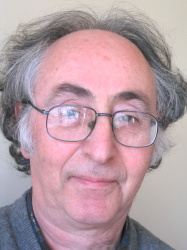Brian Josephson

Prof Brian Josephson
Fellow of Trinity College
Office: 532 Mott Bld
Phone: +44(0)1223 3 37260
Email: bdj10 @ cam.ac.uk
Personal web site
TCM Group, Cavendish Laboratory
19 JJ Thomson Avenue,
Cambridge, CB3 0HE UK.

Research
My research interests have been very much conditioned by the belief that current thinking in physics involves a limited approach to the understanding of reality, one dominated in particular by focussing on parts of systems and giving little attention to the fact that exactly how the parts fit together (including the relationships between system and environment) may be of crucial importance in determining the behaviour of the whole. The real story of the nature of life, and of the abilities one associates with the term mind, must involve such factors to an important extent. The physicist David Bohm talked of implicate order, the philosopher Charles Sanders Peirce introduced a concept he called thirdness, 'the tendency of things to acquire determinate properties', and again ancient Chinese philosophers spoke of li, 'the order of flow, the basic pattern of the universe'. These ideas all point towards a subtle kind of order, related to the behaviour of wholes, that science has yet to come to terms with.
When I was beginning research in the 1960s, condensed matter theorists were dealing with the challenges of many-body systems, that is to say systems whose behaviour cannot be accurately understood simply as the behaviour of a set of individuals interacting in readily visualisable ways. Challenges since then have included chaos and complexity. Order-in-complexity, which is in essence what I and my colleagues are concerned with at this time, must be the next big challenge: just as was the case with my research in the 1960s, to whose conclusions no fewer than two physics Nobel Laureates raised objections, this may lead to the overturning of ideas fervently held by the scientific establishment.

In Plain English
The thinking behind our group's activities is the elevation of mind to its due status (the mainstream in science having adopted the contrary view that particles and fields are all that need to be considered at a fundamental level). Theories that take mind properly into account may well turn out to support claims that are commonly rejected on dogmatic grounds (see lectures in the video-lecture collection in the section Featured Publications).
Featured Publications
click here for full publication list-
How Observers Create Reality
Preprint (2015).
arXiv:1506.06774 -
Biological Observer-Participation and Wheeler's 'Law without Law'
Published in proceedings of ACIB '11 conference, "Integral Biomathics: Tracing the Road to Reality" (2011).
arXiv:1108.4860 - Pathological Disbelief Lindau Nobel Laureate meetings (2004)
- Biological Utilisation Of Quantum Nonlocality Found. Phys. 21 197 - 207 (1991)
- Limits to the Universality of Quantum Mechanics Found. Phys. 18 1195 - 1204 (1988)
- What can Music tell us about the Nature of the Mind? A Platonic Model Published in proceedings of conference 'Toward a Scientific Basis for Consciousness', Tuscon AZ (1994)
- "We Think That We Think Clearly, But That's Only Because We Don't Think Clearly": Mathematics, Mind, and the Human World Talk given at the conference "Home and the world: Rabindranath Tagore at the End of the Millennium", Univ. of Connecticut, Storrs (1998). arXiv:1307.6707
- Lecture collection including 'Biological Aspects of Fundamental Reality', 'Shifting Assumptions in Science', and 'Heretical Science'.